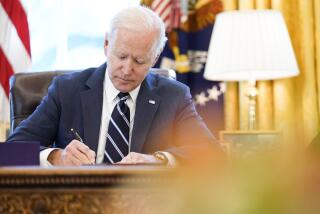Group Faults Use of Tobacco Case Funds
- Share via
Despite hailing their landmark settlement with tobacco companies as just the start of their war on smoking, many states are poised to renege on that pledge by spending the windfall on nearly everything but curbing tobacco use, according to a report issued Wednesday by a leading anti-smoking group.
As governors and state legislatures debate how to manage their settlement wealth, programs under serious consideration range from property tax relief in Connecticut to college scholarships in Michigan to upgrading the state morgue in North Dakota, said the 38-page report by the National Center for Tobacco-Free Kids.
Only four states have committed to funding anti-smoking efforts “beyond a minimal level,” the report said. And 16 others either have decided or are being pushed by governors or legislative leaders to spend from nothing to 2% on anti-smoking efforts.
While acknowledging that most states have not made final decisions, the report said it appears that fewer than 10 will fund significant anti-smoking programs.
Since the state lawsuits were intended to recover costs of treating smoking-related ailments, failing to invest in reducing the future burden of disease “is extremely shortsighted . . . from a purely economic standpoint,” said Matt Myers, general counsel for the national center.
The trend would seem to be great news for the tobacco industry, but a Philip Morris spokeswoman said the firm agrees that “the states really ought to be . . . spending the money on youth smoking prevention.”
The states collectively will get as much as $10 billion annually, from November’s $206-billion settlement involving 46 states and from previous agreements with four other states totaling $40 billion. The settlement, which also banned tobacco billboards, did not dictate how states could spend the funds.
But many attorneys general and other state officials vowed to support major initiatives to deter teen smoking and wean longtime smokers from the habit.
The deal also created a national foundation that will get $325 million in each of the next five years for anti-smoking advertising and research. But Myers said the foundation was meant to support, not replace, state programs. His group and others have called on states to devote as much as 25% of settlement proceeds to tobacco control.
But some state officials have cited other pressing needs for the funds and expressed skepticism that huge investment in tobacco control measures will discourage smoking.
California Gov. Gray Davis--who last year attacked gubernatorial opponent Atty. Gen. Dan Lungren as being soft on Big Tobacco--has proposed putting the state’s first $562 million in the general fund, without earmarking any of it to fight smoking. Several bills pending in the legislature would direct settlement funds to specific programs--some related and others unrelated to tobacco. Davis aides failed to return several phone calls.
California’s situation is cloudier than most since it already runs the country’s biggest anti-smoking program funded from Proposition 99, the 25-cent cigarette tax increase.
And with half of the roughly $1 billion of California’s annual payments destined for local governments, counties and major cities are also debating use of the funds. Los Angeles Mayor Richard Riordan raised eyebrows by suggesting it be spent repairing sidewalks.
According to the report, only Washington, Maryland, Montana, and the tobacco stronghold of Virginia “have made commitments to fund tobacco-prevention programs beyond a minimal level.”
In Massachusetts--a prime mover in the legal assault on cigarette makers--Gov. Paul Celluci has proposed a single tobacco-related effort: a review of the state’s current anti-smoking efforts.
The report noted that Florida--which concluded a separate settlement with the industry for $13 billion in 1997--is about to cut funding for its highly successful anti-smoking program under a proposal by Gov. Jeb Bush.
More to Read
Sign up for Essential California
The most important California stories and recommendations in your inbox every morning.
You may occasionally receive promotional content from the Los Angeles Times.













